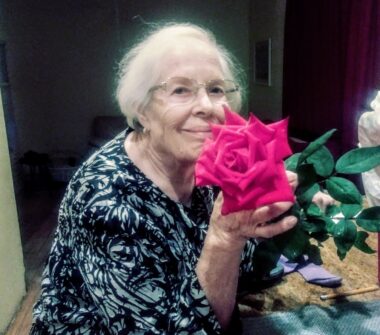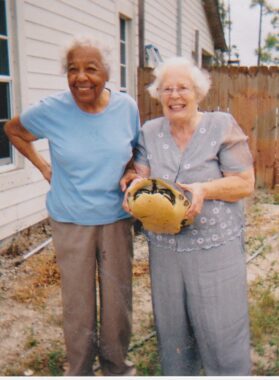A caregiver says goodbye to her loving mother-in-law
Short-term memory loss didn't stop a caring relationship and united family
Written by |

Marriage is the union of two people who become one. Anyone who’s “jumped the broom,” however, can attest that marriage is also the union of two families. Parents transform into in-laws and embrace shared children.
Sadly, in American culture, mothers-in-law receive a bad rap. They’re the unfair and easy targets for sitcoms and stand-up comics, and it’s the rare person who’s not either heard or, God forbid, told a mother-in-law joke.
Speaking for moms-in-law everywhere, I don’t like it. The female in-laws I knew and loved, long before I became one, were beautiful examples. My husband would praise my mother, the inspiration behind “Treading Dark Waters,” as a loving, caring individual who loved him as her son. His mother, my mother-in-law, was equally kind and wonderful to me, and I also loved her as my own. Her name was Shirley, and two weeks ago, God took her home.
Living with dementia

Shirley was a wonderful mother, mother-in-law, grandmother, and friend. (Photo by Ray Burow)
While my mother inspires “Treading Dark Waters,” Grandma Shirley has also been featured in this column. Shirley had short-term memory loss but not Alzheimer’s disease. That memory loss progressed with age, possibly brought on by small strokes. She fought her way back from a major stroke when she was well into her 80s.
Shirley lived with our family in Florida for three years before moving back to Colorado, to the mountains she loved and her loving family. She enjoyed living with us for the most part, but she always longed for home and missed her family there. It became too difficult to travel back and forth, and though she returned to us after a three-month visit, she decided to stay out west, where my brother-in-law and his wonderful wife looked after her. She also visited with her younger son and was closer to her siblings and one of her six grandchildren. She was happy.
Shirley was a fantastic mother, mother-in-law, and grandmother. She was also a friend to my mother before and during Mom’s bout with Alzheimer’s disease. I attempt to emulate their example of sharing children and grandchildren. Our families bonded well; I believe each mother-in-law can be credited.
For many years after their retirement, my parents and my in-laws flocked to us in Florida during the winter months. Their visits often overlapped, and they hit it off. We all had many dinners together, and they became friends. They even visited each other’s homes in Colorado and West Virginia. After both grandpas’ passing, Florida became my mother’s permanent home, and Shirley continued to visit each winter.

From left, Ray’s mother, Ruth, and Shirley, Ray’s mother-in-law, were game for anything fun. Here Shirley holds a turtle. (Photo by Ray Burow)
Alzheimer’s stole many memories from my mother, but she never forgot Shirley and asked about her often. It took a while before I realized that Shirley and my mother related on a different level from us because they were peers. As children and caregivers, we believe we should be enough, but my mother thrived in conversation with Shirley. She lit up and laughed, and it was evident that their shared age, interests, and families created an atmosphere for my mother that we couldn’t manufacture.
As my mother’s disease progressed, Shirley continued to be kind and patient. They remained friends until Shirley was the last grandparent to continue their legacy.
Shirley lived more than two decades after her husband’s passing, and 18 and 12 years beyond my parents’ lives. It must be difficult to be the last grandparent.
Thanksgiving is a holiday our family shared with both sets of grandparents. We observed a tradition that many people do: Before the official prayer blessing, each person at the table states something for which they’re thankful. Shirley often couldn’t. With tears in her eyes, she’d say, “I can’t, just everything,” something I understand more with age.
One Thanksgiving, or perhaps it was Christmas, we were gathered at the table, and my sister drew our attention to something remarkable. Looking around the table, she noted that no one seated would be present if it weren’t for the matriarch sitting next to her son. Outstanding.
The challenge
Shirley and I had always enjoyed a good relationship, but caregiving presents a significant role reversal, which was challenging for each of us. A caregiver’s responsibility is to keep their loved one’s best interests at heart. Sometimes what’s best for the loved one clashes with their desire in that moment, or even in the long term. It’s not fun, but the caregiver should stand their ground when necessary.
I feared how caregiving affected our relationship, but even on our most challenging days, I loved her and knew she loved me. Last summer, I visited Shirley in Colorado, and we were genuinely happy to see each other again. I was relieved.
I’ll forever remember Shirley with great fondness and will be grateful to God for giving me a mother-in-law who defied the stereotype. Grandma Shirley, I’ll meet you in the morning.
Note: Alzheimer’s News Today is strictly a news and information website about the disease. It does not provide medical advice, diagnosis, or treatment. This content is not intended to be a substitute for professional medical advice, diagnosis, or treatment. Always seek the advice of your physician or other qualified health provider with any questions you may have regarding a medical condition. Never disregard professional medical advice or delay in seeking it because of something you have read on this website. The opinions expressed in this column are not those of Alzheimer’s News Today or its parent company, Bionews, and are intended to spark discussion about issues pertaining to Alzheimer’s disease.







Audrey Altman
This was a very meaningful and touching article by Ray. I too care for my mother-in-law and relate to so many things Ray expressed in her writings. Beautiful written and so helpful in navigating through this journey of caring for aging parents. Thank you.
Ray Burow
Thank you, Audrey. God is good to give grace, isn't he. I am absolutely sure that you provide the best love and care for your mother-in-law. She is blessed to have you, and I know you feel the same.
Sending up prayers for your journey as I write.
Ray
Cathy McCormick
Ray and Family,
Larry and I share in your loss...This beautiful piece of writing carries a true family legacy, for which we thank you. Always know our love and respect for Shirley will be carried in our hearts just as in yours.
Love,
Cathy and Larry McCormick
Ray Burow
Thank you, Cathy!
We're grateful that God give her to us and for her life that was well lived. Thank you for your gracious and kind comment.